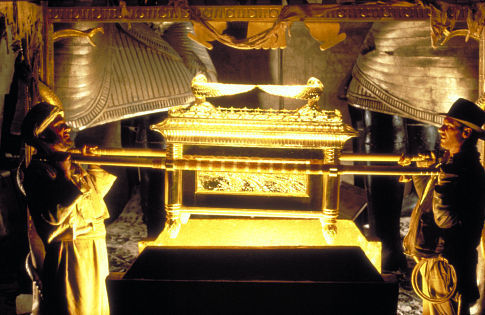 1981) is either a movie you may really like, or you will seriously hate. But there are, nonetheless things we can derive from the film, its critics, and its portrayal of an heroic vision that somehow does something profound to us.
1981) is either a movie you may really like, or you will seriously hate. But there are, nonetheless things we can derive from the film, its critics, and its portrayal of an heroic vision that somehow does something profound to us.Raiders of the Lost Ark ( 1981) is either a movie you may really like, or you will seriously hate. But there are, nonetheless things we can derive from the film, its critics, and its portrayal of an heroic vision that somehow does something profound to us.
1981) is either a movie you may really like, or you will seriously hate. But there are, nonetheless things we can derive from the film, its critics, and its portrayal of an heroic vision that somehow does something profound to us.
In 1981 the film's release marks a turning point in American culture. Largely derivative of the changes in society the portrayal of the past in general and of the events preceding the Second World War are most remarkable.
New Yorker critic Pauline Kael wrote
"But “Raiders” is a machine-tooled adventure in the pulp-esoterica spirit of Edgar Rice Burroughs; it appears that Lucas and Spielberg think just like the marketing division. According to modern movie legend, Lucas, who had watched the serials of the thirties and forties on television in the fifties, has long cherished the idea of a hocus-pocus series “following the exploits of an adventurer/archeologist, Indiana Jones,” but he got more interested in his other idea—“Star Wars”—and put “Raiders” aside, for later. Over the years, he worked up the story idea with Philip Kaufman—the first picture was to be set in 1936, in order to take advantage of Hitler’s well-known interest in the occult—and in 1977 he offered it to Spielberg to direct."
Kael wrote further that the film stands as a new mastery of the tools to alter the film medium:
"A Lucasfilm, financed by Paramount, “Raiders” is an old-fashioned cliff-hanger produced with incredible sophistication of means. The images have an unreal clarity: the camera shows us more than we could possibly take in if we were there on the spot. And the hero—Indy Jones (Harrison Ford), the daredevil archeologist, whose weapon is a bullwhip—makes the kind of bright-eyed entrance that’s so intensely dramatic it’s funny"
To my mind this is a film about outwitting the Nazis, dimly understood religious fundamentalism and androgynous love. Indy Jones is an academic in drag fighting the evildoers with a bull-whip and heroically stops Hitler from attaining the Ark - as a weapon of mass destruction. But his love or female interest is way less feminine than previous heroines in American film and she can fight as well as drink better than any man we may wish to idolize. So she becomes the female avatar of Dr. Jones the befuddled, but always wily (Ulysses) and thus a triumphant white dude who kicks but in the Holy Land. The German's are of course his nemesis -- the enemy of the good, the holy and the innocent. But these are one dimensional --cartoon-- Nazis and herein lies the danger of the film's slick cinematography, shallow storyline and rapturously religious ending.
If you find these Nazis, clumsy buffoons or amusing you may agree with me that rom this damaging portrayal we may find two lessons:
A. the importance of the film as an indicator of a turning point in national attitudes about Hitler and the Nazis, due to Iran,
B. the disturbing subordinate message of the movie that evil doers are inept in the face of honor, intelligence, and loyalty as all wonderfully important expressions of the good, is the second dangerous fiction presented by the film.
Watch this picture show for its exotic charm, cinematic magic and childlike adventure, but let me know if it makes you, nervous. Maybe so disturbingly nervous that you will want to look below the imaginary surface to the real rewriting of the past to suit the mood of the early 1980s. That mood was embodied in the mission that we have to kick some ass in the middle east because we are so damn white, tough, and good.
Joseph Siry
2008